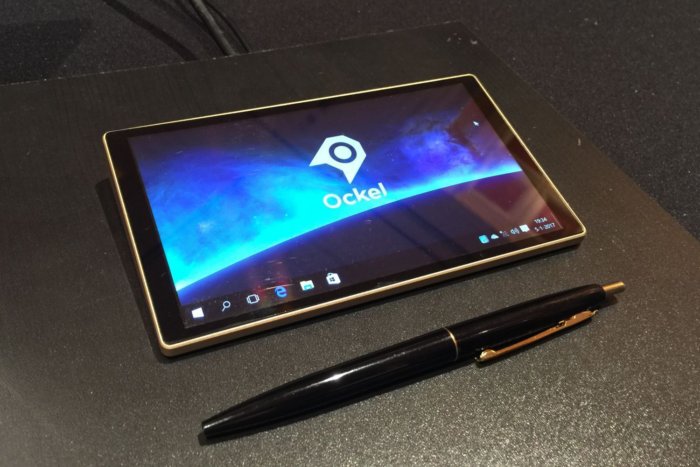Windows 10 pocket-PC manufacturer Ockel creates the one device that will make you say “I’ll stick with a Windows 10 laptop, thank you very much”.

Startup Ockel is at it again, after its 2016 debut of Sirius A, a pocket-sized PC, running a desktop version of Windows 10, and powered by an Intel Atom processor. The startup has made an appearance at CES 2017, with a prototype very similar to the one we have seen last year in October, with more of the same configuration, still powered by an Atom processor, and with similar RAM and storage specs.
As it happened, Ockel did manage to raise almost half a million dollar for the construction of the prototype seen at CES, with a concept that on paper could be of interest to some, as it could, in theory, be plugged into any external screen, or HDTV, and turn it into a full-size desktop PC.
With half a million raised, one would think that a working prototype is a fair expectation. Sadly, the unit on display at CES was far from impressive, as the connected touchscreen was apparently completely unresponsive, and some of the ports were also not working.
Like we said back in October, cramming a desktop-class PC, powered by a netbook-class processor, into a wallet-sized case, isn’t exactly the best idea, without some kind of breakthrough in heat dissipation, which is but one of the several speed-bumps to get through, prior to a real working prototype.
Ockel’s target date to ship the unit to backers, is set for May 2017. Will the company deliver? While it may be too early to draw any conclusion, by the looks of the current prototype, it seems that some of the most crucial issues will need to be addressed, particularly in regard to the ability for the unit to operate for an extended period of time, without roasting due to the poor ventilation, and very little room for heat dissipating materials, except for the casing, which may, or may not be enough, depending on the internal configuration.
When looking at a MacBook, for instance, the entire outer shell is one big heatsink, which is what allows a 12 inch fanless MacBook to operate by keeping the internals at relatively low temperatures.
The problem is that the amount of heat dissipating material in a MacBook is far greater than what we seen on the Sirius A. Also, a unit this small has no room for any other cooling method.
If Ockel really wants to run Windows 10 on its Sirius A, compromises might be in order, that could curb some of the enthusiasm from Ockel’s backers. With that said, it could also keep this product from being a total flop.
Taking a page from Microsoft and Intel, ARM processors will soon be capable of running Win32 applications, which means that desktop operating systems like Windows 10 might be able to run on ARM devices, with a lighter impact on battery life, and less heat to deal with, compared with a desktop processor, or ultraportable CPU like Intel Atom.
The drawback would be the inability to run 64-bit applications, at least for the time being, and the need for a specific Windows 10 version created to run on ARM devices.
With that in mind, May isn’t exactly around the corner, so we’ll be watching.
Ready to shop?
PortableOne has the best deals on Windows 10 Pro laptops, featuring the latest hardware-based security features, and full BitLocker encryption to protect your files from prying eyes.